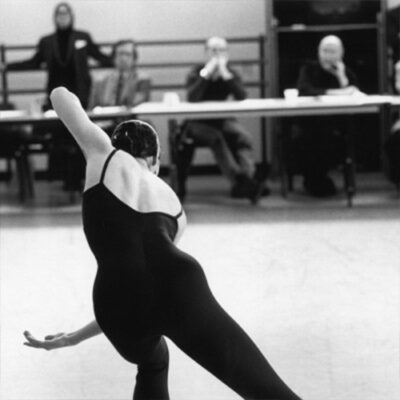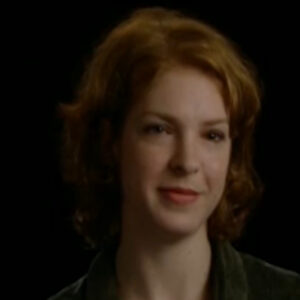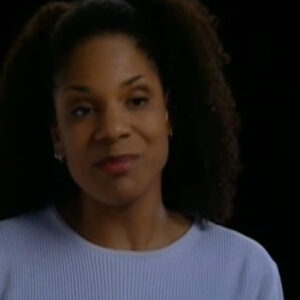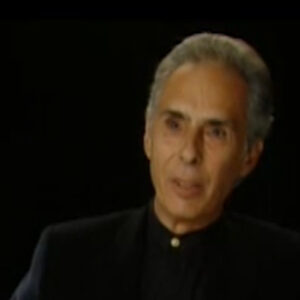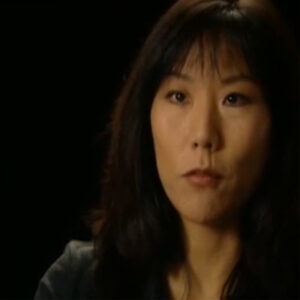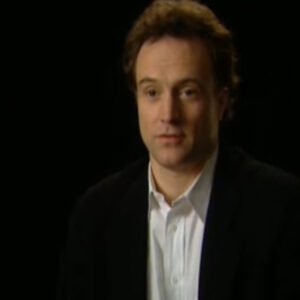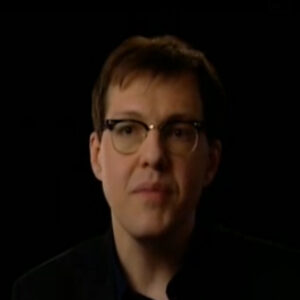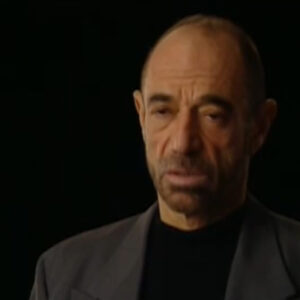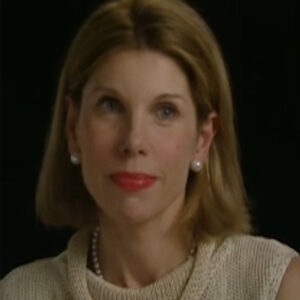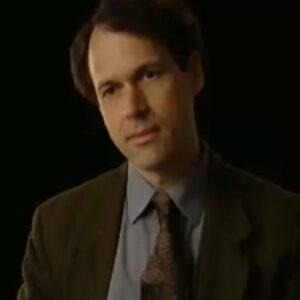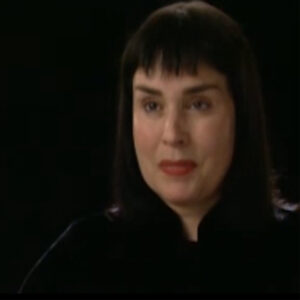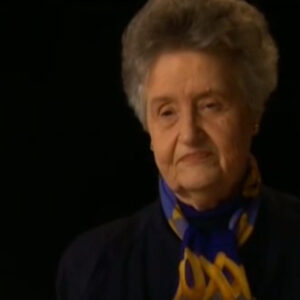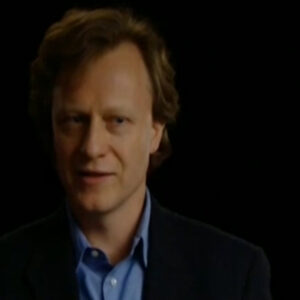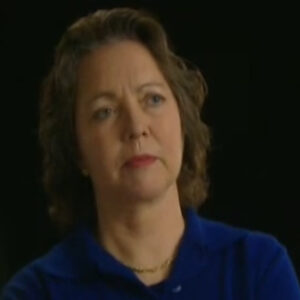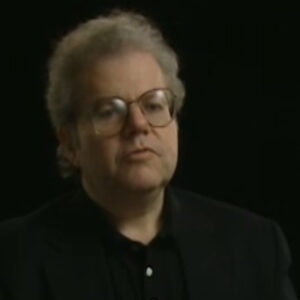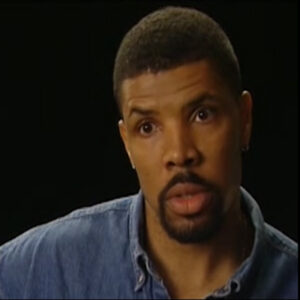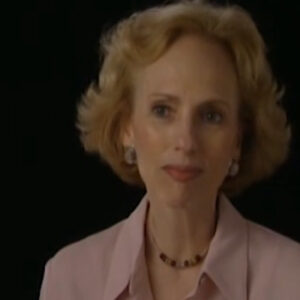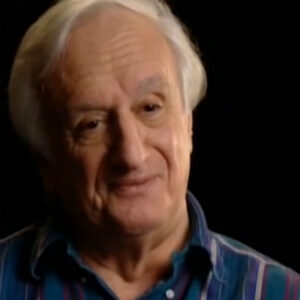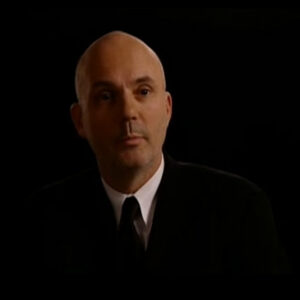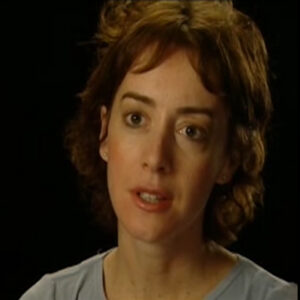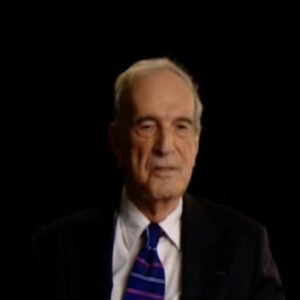Speaker So I want to start by talking about your time as a student. I mean, when you came in when you came to the I’m a.
Speaker What was it like? And the sensibility of the place? I mean, it was just after Damrosch had passed away.
Speaker What was it? What was the I mean, like at that time and what made you go?
Speaker All right. First of all, I became a violinist by happenstance.
Speaker In other words, it wasn’t something that was ordained. My parents loved music. My mother sang in choruses all her life. She even sang in the Portland, Oregon Symphony cause she sang in the Brooklyn Symphony choir. She sang in the Y Amaechi when she moved to New York. They all want me to study music and I chose the violin. Don’t ask me if I thought it was lighter than the piano and I didn’t take it very seriously. I started when I was about eight and a half, and then we moved to a town where they made cheese much better than they made music. And I finally had a violin teacher, was always drunk and was trying to raise tulips. And after I had studied with him for about six months, in which he taught me very negative things, somebody shot him dead. And so that was the end of my first violin teacher. After that, when I came to Portland, I’ve really met a significant person in my life. The concertmaster of the Portland Symphony Orchestra was a Swiss man. He had two things going for him. First of all, when I played for him, my father was very anxious that he teach me. Of course, we were poor. And this Mr. Herman answered, my father. I remember very vividly said, Mr. Man, your child is no wonder, Kint. And if he practices, he can earn a living in music. And I will teach him on a scholarship with one condition that you never show your face in this studio again. So he and I bonded very fast. He was a great fisherman. He taught me how to fish. He taught me really how to play the violin. He more than that. He taught me what music was really about. And I’m all my life, I’ve been grateful to him. When I finished high school, I had. It was ordained. You know, everybody went to study in either New York or Los Angeles or places like that. And I thought I was in rolling in the Juilliard School. It turned out that I had the addresses wrong and I was really applying to enter the Institute of Musical Art. And for that, I had wanted to study with the same teacher that taught menu and then reach and all those. But he wasn’t available. So I happened to be placed in living quarters of a mother of a very outstanding young lady at that time, Carol Glenn, who is a violinist, and she was studying with Mr. Edward DHEA. And so I ended up studying with Mr. DHEA in the institute. And you have to know that I had no, shall we say, proper musical training. I mean, playing the violin. Yes. And I play lots of charities because I loved it. And I was in the port and junior symphony. But I had and I composed since I was 13. But I had no idea what I was composing was lol imitative of what I heard. And so when they gave me exams to place me, I failed everything. So they put me in the first year. But after I learned the Norman Claytor, which took maybe about two weeks or three weeks, they put me in the second year. And finally, by the second month, I was graduating in one year. You see, and I remember one very specific incident. We had a bar chorale harmonization and we had a very strict teacher who would take your example of what you did and then put box right next to it and put lots of red lines through yours and say how terrible you were. And finally, I got tired of that. So I knew the Lybrand down at the music library in New York, which was between Madison, round 58 st. And I said, you know, Bach harmonized chorales many times, not just once. And I brought my assignment. I said, is there another book that might have a different Bach harmonisation of the same chorale? And so she took me into the reference and gave me Crüe, which I she loaned. Let me take out the reference book. And so I put my copy of Bach’s harmonization in front of this teacher. And he went with the red pencil, you see, and said, you see back over here, did this. And look what you did. And when it was all finished, I took out the book that had the one I copied and said, well, what do you think of this harmonisation? Well, he went. He disappeared out of the room. And he came back about 10 years later and said, Mr. Wedge, Mr. Wedge was the head of the student. We’ll see you now. And so I came in this very short, white haired man looking very severe sitting I thought was gonna be thrown out of the school. And he said, Sudani on it. So I sat down for about 10 minutes outside, looked up and he was grinning. He was ready as so I couldn’t understand what was happening. He said, now, you know, as a young man in a class, you shouldn’t do things like this. What we’re going to do is excuse you. And you just take the exam at the end of the year. So in that sense, I did very well in the institute. But on the violin, I did very poorly. And the reason I did poorly is because it’s the first time I really came to grips with a young man interested in girls. A young man without parental, you know, cover. So we used to stay up till four o’clock in the morning, you know, and things like that. And when I did my exam to graduate, I graduated. But one violent faculty teacher said never in his whole life experience had he come across a young student who is prepared so well, who, shall we say, fell backwards instead of forwards in one year. He thought I had lost everything. So anyway, then I because I was still studying with Mr. De Chair, I tried out for the Juilliard School in nineteen thirty nine.
Speaker And then that began my Juilliard experience with their real.
Speaker I mean maybe you know this more in retrospect from when the time you were there. But there are real philosophical difference between what was going on at the IMF and what was going on at Juilliard School. I mean, I’ve sort of tended to hear that, in fact, philosophically, they were quite different.
Speaker And so that when they did finally emerge as one, there were there was a lot of it was a balancing act because they had different ideas about about what music training was about and who it was for, in a way.
Speaker Well, the institute was more generalized and it accepted it had a few scholarships. And those, of course, were very fine talents, but it accepted a lot of people who were obviously not going to make a big career in music, but might end up as teachers things. The Juilliard Graduate School, as it was called, was more like the Curtis Institute, if only with scholarships students. So therefore, the level of playing throughout the whole student body was much smaller. And it was much higher. So I don’t think until William Schumann arrived on the scene, that philosophy in terms of the vision of what training in America for musicians, young musicians. I don’t think it was such a big difference. But of course, he brought in a whole new idea of studying literature and materials rather than, you know, you did your counterpoint and you did your harmony and you did went from step to step throughout the thing where his idea was to study all the acid aspects of music all at once so that it was a holistic kind of approach to a musical training. That was a big difference. Did.
Speaker A little bit talk about when, you know, you were. I read that you were when your years at Juilliard Graduate School, you were concertmaster.
Speaker You were doing.
Speaker What was your what kind of. How did your work change? I mean, you were saying you went on to. Yes. Haven’t even told you, you know.
Speaker Well, obviously did not really state of the thing.
Speaker You have to understand that I never went the usual gifted prodigy path. I was not that gifted. I mean, I’m not being modest. I, I was a very intelligent and very enormously motivated to be a musician. But my physical aspects were I mean, they were okay. I mean, I could play quite well with some, but never on the level of the really what we call Hot Shots, you know, the ones who could sort of play Paganini Caprices without practicing them. There are coordinative people like that who are just unusually talented in the physical aspect of music. To illustrate that when in 1946 I became a teacher at Juilliard. I wasn’t allowed to teach quartets because we already had a very famous quartet teacher, their. Hans. But I was designated to teach sonatas for, say, maybe 10 violinists and three pianists. And all of them were the best players in the school. And I was literally quaking in my boots because I knew that every single one of the violins could easily outplay me in terms of the physical aspects of playing. But what I discovered very quickly was that they didn’t know much about the technique of making musical expression come alive. In other words, let’s say to make it very simple. Beethoven, in a sense, develop something that’s quite unique to Beethoven. The idea of building up to towards a climactic moment and then Oveson pulling the rug away and being subito as if it weren’t climactic at all. Very soft. You see from very loud to very soft or vice versa, that even there’s a story that Beethoven was conducting. And when he wanted this, Civita will mean immediate soft sound. He would disappear behind the music stand. You see that he was conducting from or out or he would jump up when it was a swedo, loud, you see, or other kinds of things. You can make many kinds of sounds. You know, a sound begins. It has a middle and an end. Most people practice only how to begin sounds. They very seldom practice the quality of a sound, no matter how long or how short is throughout the sound to the very end of it. And that in really, if you examine the great music making of all the greatest artists, at least in my experience, they control every sound in relationship to every other sound in relationship to the whole piece, you see. And that’s something that takes great development.
Speaker So what was the what was the environment of the school like, you know, when you were when you were still a student?
Speaker The building, the other people, the lunchroom, I.
Speaker Well, you make reference to girls and distraction. Well, what was you know, what was the sort of social feeling coming from, you know, outside Portland?
Speaker I mean, it must have been I mean, New York. It must have been quite a different scene at that.
Speaker I thought it was a mixture of of very heady experiences and very scary experiences, because you were literally I was living off an experience that was quite local in Oregon. I’d lived in small towns and then a little bit in Portland. But he was an enormous big city. We could go down to 110 if history where there was a ferry that went across my back when I was teaching these. I remember I mentioned the students that studied sonatas with me when I was a beautiful day. I say, wouldn’t you rather take a walk? So we would go down and I would treat them to a five cent ferry ride across over to the Jersey side. We walk up to where they were building the George Washington Bridge or, you know, that kind of thing. But basically, the level of music making and and all the talents around were were scary. I mean, it wasn’t that I was in competition with them, but I felt it illuminated what I needed and what I lacked. You see much more to be in the in the presence, for instance, of a good friend of mine was Willie Capelle. Willie Capelle was one of the great talents of America. And as a matter of fact, I can tell you that we were pretty not rebellious, but pretty free spirits. For instance, if we want to practice at night. Yeah. To get out of the Juilliard School at a certain time, I can’t remember 10 o’clock or whatever, we would hide in the wash closets, you see, until the cleaning lady said sort of disappeared and then we’d go to studio and practice all night. I mean, really a night and you didn’t do things. You don’t do things like that today. She would be art. We we played a lot more chamber music for fun. And we we just got together and said, let’s make music. You see today. Lot of this there are some students who do that, but it’s changed. Now, the focus is really on almost an Olympic standard. You know, that you have to if you can’t jump to the highest leap or the farthest, the more you can’t run the fastest distance, you’re not going to make it as a musician. That doesn’t mean that people aren’t responding still to personalities and good musicianship and things like that. But basically, I would say the majority of students are terribly focused on on merely the physical aspects of their art.
Speaker Well, it sounds like it sounds to me when I talk to other people about these earlier years, that there is a camaraderie, a level of discussion, a level of because not everyone is going to be the soloist.
Speaker So in a way, those conversations, that activity, that stuff created, all these things that I think enrich the idea of other options.
Speaker It was a looser society of young people. I mean, in other words, we didn’t have such fantastic hopes and visions, you see. So we. We were more relaxed and and we just took things as they came rather than thinking about what’s going to happen on ahead.
Speaker You see, we did.
Speaker Yeah. It just strikes me as a little bit sad in some ways, because if you don’t get that thing nowadays and so many people won’t. You’re losing your love of music in a sense.
Speaker But I think I think what we’re discussing right now is what’s happening not just in music, but in every field, in every aspect of life. There’s some it’s not that it’s more stressful, but there’s a much sterner competition for success. And and, well, I take it back. There’s also, you know, you could win a million dollars on television just by chance. But there’s a kind of a madness about it, because in the old if you think back to the medieval times where you had people were apprenticed, see, a person didn’t learn to make a violin just by going to school and and working hard. Everything. When you were in your pre teens, even you were apprenticed to a great maker. If you were lucky and you spent years developing a form of how you worked in your profession, the same with violin playing or piano playing or all the things. Today, it’s it’s really now more an Olympic competition approach.
Speaker Yeah. Did you find that? As a student.
Speaker You were under a lot of stresses and challenges. I mean, were you. Were you. Did you find it very competitive even in your own time? Or was the competition? Where were we?
Speaker It was less competitive. No, no. In those days when I was a student, competition was not. You might say, a major propellent of our activities. We’ve I don’t want to sound like one of these old geezers who says all the old times were always better than new times. There are many young musicians today who are just as involved in music as I ever was. And and that’s wonderful. But the numbers have increased so much that we lose sight of the fact that that’s more important. What I tell all my students right now is that it’s moot. They are just so many places that you can sheave a kind of professional success and you have to pick your spot, but don’t hope for the best, hope that you will never lose your love of music and that you will find a community. I don’t care where it is. It can be a pioneer and and develop in that community. A sense, in a sense, your audience, in a sense, new love of music by people aren’t your competitors, but are just your your audience and your your community colleagues. And that’s the way music has to redevelop. I feel that we are today facing the same thing that happened in the earlier 20th century when because of the communist regime, because of fascism and Naziism, enormous amounts of really fantastic musicians from Europe fled to America. And here I would be sitting in the one violin maker in the town of Portland and inward come a man who is obviously Russian. And I didn’t know him. And it turned out that he had played chairmen’s equipped Baudin. I mean, you know, in other words, he had been a very viable and outstanding musician in in Russia before the revolution. And he had fled. And here he was putting out an advertisement in Portland, Oregon, hoping to get enough students so he could live. You see, I think today that that the music profession is so crowded that we need more of this kind of pioneer attitude to make a life. It doesn’t matter where you make it. In other words, you don’t want only to have the best management and only play with the greatest orchestras, solos and and all you see. That’s not really what I think the future of music is going to be. I mean, there always be that. But we need all these musicians. Well, maybe like myself who just love to teach, love to make music and did it wherever I could.
Speaker Well, on that note, let’s talk a little bit about about Schmidt and, of course, the thought of the development of the Juilliard string quartet that came in that time between Schumann.
Speaker What was he what was he like? What was what was what was billed Schumann’s great vision. I mean, it seems very lovely. From whenever I see footage of him, I’m just interested.
Speaker Well, Bill Schumann and frankly, his wife became very dear friends of the man family. And for that, I’m eternally grateful. But I have to speak of, if I think back, how did it all happen? First of all, when I was a student at Juilliard, one of the really best influential musicians in the school was the man who was the assistant conductor of the orchestra. Its name was Edgar Shaiman, and he was a friend of Schuman’s. And so when I was stationed at Fishers Island in the Army and fairly close to being discharged, but we would come in on, passes various ones of us and play Cheiron music at Edgar Schaikewitz home in New Rochelle.
Speaker And after, you know, we’d always eat and have some fun and be talking. And I said, Don’t you think with this new president of Juilliard, William Schumann, that it’s about time that Juilliard had a resident’s string quartet? I was interested in string quartet. So Edgar Shenkman looked like the Cheshire cat that just swallowed something and and said, I happen to know that’s exactly what he has in mind. So then he said, why don’t you write me a letter? What? Write me. There’s Edgar speaking. You write me a letter saying what a resident quartet could do in the school. What use would it be? So I was with Robert Koff, who was the first second violence of the quartet eventually. And Arthur Winograd, who was on my post, who was the cellist. And we didn’t have Aveos we concocted a letter.
Speaker I remember Shankman sent it back to us. He said, you haven’t concentrated enough on contemporary music. William Schumann is a composer and you should mentioned what the quartet would do about contemporary music. Well, I was a composer, so it was very easy to add these things. And lo and behold, the next thing I knew was that I was asked for an interview with William Schumann. I didn’t know him.
Speaker And he was a very sharp man, very intelligent. I could tell that. And I decided I just gonna be myself. You know, I’m not going to angle for anything. So we talked interestingly enough, we talked about music. He didn’t talk about job. He said, what do you think about this when you think about that? And I said something that later became a kind of slogan. My feeling was at that time that it was important to play old music as if it had just been written. And new music, as if it had been around for a long time that, you know. And he loved that. So I confessed. We didn’t have a violist. He said, take your time, find a violist. And that’s how the G.R. Quartet began.
Speaker And why?
Speaker Why it was so important that an institution like Juilliard have a resident string quartet. What did that what did that mean? You mean what did you write in that letter? What what was the feeling? Why so important? I ultimately became so poor.
Speaker Well, there are, first of all, from a general aspect, the whole art form of musical expression.
Speaker It explodes from every aspect of of a social situation. In other words, you have folk music. You have pop music. You have the music of the culture of tradition. The music that is coming out of the present into the future. And of course, we have in Western civilization, we have an enormous body of great art music like Shakespeare, like Bach, like Beethoven, so on. And we have composers who are still interested in exploring that kind of subjective thing. It’s not like, you know, anonymous art from medieval times, everything. So a good school attends to all the aspects of the art you have singing. You have instruments, you have composition.
Speaker You have then then you start intermingling them. So you have an orchestra. So you have opera productions which involve orchestra and singers and so on and even stage sets and designers. But you also have a great body of chamber music. Music came out of singing, first of all, in the earlier times and then began to be instrumental. And it has two aspects that are very good in a school. One is it had some of the greatest music ever written was written for chamber music. That’s the first thing. But second of all, learning to play with a small group of people that you meet with all the time is one of the best training grounds sociologically on how to behave in a community, you know, with your colleagues. I mean, when you’re in an orchestra, there’s the guy waving the baton and yelling at you or encouraging you and inspiring you. And that’s your one of a heard, so to speak. I mean, you contribute a lot, but you’re not making decisions. But in chamber music, when you learn to play chess music, you have to make decisions all the time. That’s the same as a soloist, except that it even involves sometimes music that’s much greater than what the solos. If a soloist plays a display piece, you know, and shows off like in a circus, you know, walks a tightrope. That’s one thing. Or they can play a great piece, too. But if you’re playing the Beethoven cycle, all 16 string quartets, you’re playing great music from beginning to end. You see, you’re constantly dealing with great music. And that’s a great training for for for anybody. As a matter of fact, interestingly enough, people, wonderful performers in the solo feel like it’s OK, it’s OK. And I had a very close relationship for a long time. And at one point in Aspen, he wanted to play all the late Beethoven quartets because he felt he’d been excluded from that quality in his life. And so he did.
Speaker And did you. And what was the initial formation of the string quartet? How did it work? Were people just loving it? Where people come in? How did it really. How do we get together? Well, how did you gain. It’s incredible.
Speaker I mean, it not only became an incredible quartet associate for the Senate, it was a very important American musical.
Speaker Well, first of all, I never had any problem of knowing what I wanted to do.
Speaker I did play some solos. I played the Prokofiev G minor concerto with the school orchestra. And Willie Kapell was a friend. The first summer that the quartet was getting together, I said, Why? Why are you doing this quartet thing? I mean, I know that you could play in, you know, in a concerto, in a solo career. You could make it. I wasn’t so sure. By the way. But he felt I could. But I said, no, Willie, I am interested in quartets.
Speaker As a matter of fact, I can tell you one funny story when I was a student had ulcers. So I would take a break from working in the morning at the student lounge and drink some milk. And there was a guy there was obviously not a musician. He was a little older than I was. And we got talking and course being young and full of myself, I was telling him what was wrong with the chamber’s situation in America. And. He said, oh, that’s very interesting. Said, you know, I have chamber music once a week at my house. Would you like to join us? So I said, sure. So he gave me an address. So it was on the top floor of the Oliver Cromwell building.
Speaker And we got up there. I knocked on the door.
Speaker And Isaac Stern answers because he stayed with this young physicist. I didn’t know that. So Isaac Stern was there. So then we’re mixing and there were some other people. And then all of a sudden a knock on the door on William Primrose came in, who was the great violist of our generation. So by then I was thinking, what am I getting into? And so then finally, incomes Piatigorsky add. And of course, I sit very quietly in the second violin seat and High Goldsmith, this man who became a great friend in my area, said, Well, now show us what’s wrong with terrorism.
Speaker Well, I’ll tell you what was wrong. We just read music. You see a string quartet that devotes itself really to the literature. It’s like a repertory theater. And you develop relationships between each other. That can’t be achieved in the even inspired reading of music.
Speaker Awards and even the competitions within the school. When you’re there, whether to play with a concert. Who was it then?
Speaker I mean, as it seems now, very geared toward performance, whether that’s competitive or not. That sense of playing. Yes. And maybe in chamber groups, there’s something about the playing together. But is there still that level of of critical importance of the audience, whether it’s the audience of a competition or or constantly gearing towards performance towards.
Speaker You can’t just play in your studio and play well. You have to be able to play when somebody can hear you.
Speaker Well, let’s. I think that we have to establish the most important fact about music. Music music’s best moments are when it’s the sound of music occurs.
Speaker In other words, you can ruminate or be a musicologist and and delve into historically all the meanings of things. But music is to be played and to be listened to and to be responded to. And one of the things I like about Joseph polices, you might say present thrust, is that he wants everybody to be performing in the school. I mean, in other words, that’s really where you learn an awful lot as a young performer. You learn a lot more than you do when you’re just sitting in your in your little studio, you know, eight by 10. And with a piano or without a piano going over and over and over things. That’s not where you learn. You learn on the ballet. You might compare to war. I mean, you you I went through basic training, you know, but you knew that the bullets weren’t real, you see, whereas you’re in a war. You learn fast. And some people, of course, don’t survive. But but in music, you have to learn through performance. I think all people become more able to be deeply involved on the inside cycle, at the same time being able to have enough objectivity to bring it out to the public and respond, in a sense to what is happening to the public ear so that it even involves how ongoing your performances.
Speaker Do you think that a lot of people’s lessons does individual lessons or.
Speaker Are geared toward now?
Speaker Well, I can’t speak for other people’s lessons. I know that. That for me, I am constantly referring to the real situation. In other words, you’re in a studio. You’re playing a concerto on the violin with a piano accompaniment. I, first of all, am constantly reminding them of the acoustical differences they’re gonna meet up with when they play a concerto with an orchestra. Not only the orchestral difference to a piano in terms of dynamics and articulations and things like that, but also the buildings. I mean, you learn so much playing in hundreds and hundreds of different kinds of acoustical ambulances. I mean, you know, sometimes you fight that ambience. Sometimes you go with it. You know what I mean? If, for instance, if you play in a cathedral or any religious, the reverberation is so enormous that you that people are listening to the last chord while you’re playing a new chord. You see what I mean? I mean, you have to recognize that. Then you can play in rooms that are small or large, that are dry, dry almost. There’s no helpful reverberation whatsoever around your instrument. So you have to make all the things you see playing in that kind of thing is a real experience. That can only happen when you do it in the studio. You can’t teach that.
Speaker Having been obviously a student yourself and having had your own teachers and now teaching others, can you speak a little bit about this relationship between you and your student? I mean, the whole the element of of learning the critical relationship that that is in order to sort of.
Speaker Create your own musical sense. Mean, diverse. The sort of technique versus artistry. It’s a very it’s a very hard move. I mean, trying to keep your students engaged, inspired. But then technically up there, I mean, it seems to me that in a way, the backbone of all of these conservatories is that relationship and the success of that relationship.
Speaker You know, I’m thinking about how best to say this. First of all, there are, you might say, two contrasting methods of a teacher with the person working with them. The older fashioned method was that you in a sense? Put that person on their mettle to imitate you. In other words, you said, do this, do this, do this, do this. And hopefully if they did it, they would then be an extension of your artistry is a little bit like parenting, you know. And then there’s the kind and I think you have to be careful about this kind of teaching in which you hand people the tools and you make that you sharpen their minds about what the challenges from inside themselves so that even after they leave you, they’re going to be teaching themselves and searching for the things that are important to them as well as to you. So that’s a much different thing. We just have a champion as a teacher. When I was a student, Felix Salmon, he was the most inspirational teacher in the whole world. I never met. We would go in and he would start waving his arms and singing with us while we were playing. And we would reach we would be playing fantastically at that. And we go out, you know, on cloud nine. And the next day we’d have a rehearsal. And all of a sudden we’d say, hey, where’d all that go? We lost that because he wasn’t there inspiring us, you see. So it isn’t being inspired by a teacher. That is the final analysis of learning. It’s the teacher has to. And I think many teachers find this in different ways. For instance, my colleague Dorothy DeLay has found it is marvelously in terms of motivating her students. I approach it on a level that’s partly psychological, partly confrontational. I mean, other words, I don’t believe in always filling even a talented student with things they want to hear. Another is, I believe, in opening up a world which we both have to explore in terms of that person’s life in music. I even started something in Ravinia four. I got it started in which I viewed that young people who go through school are very good at inputting, but they’re not so sure of what the audience reaction and the outside world is going to do in relationship to their inputting. And so there is a kind of in-between the professional life and the student life. That is a rough time. You know, you usually find out because you play a concert, you get lousy reviews or you take an audition for an orchestra and you don’t get in. And then you’re beginning to wonder, is it me or is it then or where am I? You see. And my whole idea at Ravinia in the summertime was to find a way of imparting that kind of responsive knowledge for the person struggling, you see. So they would learn what they’re really communicating to the audience.
Speaker One thing that maybe you can speak a little bit to, it’s very it’s a very basic point, but it seems that a way these conservatory’s, especially York, have this ongoing summerlike permit now to talk with us. They are as rich a part. I mean I mean, Maestro Levine was talking yesterday very strongly about Rubini, which he’s very, very involved.
Speaker Of course, I did a lot of things with him there.
Speaker I mean, this is his life with music just so ongoing that these I mean, it’s almost it’s like, well, this is this is art. You know, it’s like it’s like this is our little winter spot and this is our little summer. I mean, it’s I mean, I need places. And of course, they’re also rather political.
Speaker There’s hierarchy’s I mean, they talk about Dorothy and Mr. Guillermina parting ways between Aspen and I was involved in that.
Speaker That’s just because I think that the audience will not even know that all of these several places exist. Well, what that’s about. I mean, with that continuing.
Speaker Let me start by saying that for years I’ve been entertaining writing a book about my musical experience. And basically I’ve come to a longtime conclusion that anything I write should reflect not just my experience, but the experience of young Americans growing up in a menu which was not sophisticated at the beginning of the 20th century was not.
Speaker I mean, we did. It’s true. We had the France Canizales teaching and a few older people doing things musically in America. But basically most of the orchestras were filled with Italians, Frenchmen and German and English people. And. And my teacher, the teachers were Belgian, Swiss, you know, English and German. I mean, the and the number of American performers and teachers was very small. And so my book would definitely be you might say, I don’t want to say the greening of American music, but in a sense, the development in the nineteen hundreds of how America came of age, where in the earlier days of nineteen hundreds to follow your studies, you went to Europe to study today. A lot of Europeans and Asian people from Asia and all that come to America to study.
Speaker And what do you think sort of accounts for that incredible shift?
Speaker I mean, it’s very obvious at Juilliard. Now, I mean, that there was no where was that core of American music?
Speaker Well, it was there. I think if you studied the history of all music in America from the very beginning, you know, when you had people coming from Bohemia who settled in the Carolinas and Virginia and had brass bands and had very good composers, you know, and you had Thomas Jefferson would say, I want to hire a gardener, but he can he also play a bassoon, as in in Italy, you know, in other words, there were people in America who loved music throughout. And we have over 100 year old symphony societies and things. But basically, it wasn’t until the 20th century that a lot of young Americans wanted to be in the profession.
Speaker And you mentioned briefly, can I still and I think it’s interesting because I know Amy and I have seen some really lovely photographs to talk a little bit about Kneisel Quartet and where that sort of. Comes into the.
Speaker Well, can I, Aysel? I’m not sure why he came to America. I mean, you may know better than I, but when he did come, he came to be the concertmaster of the Boston Symphony. I think he was involved in the starting of the New England Conservatory in some form. He was certainly the first great violin teacher in America. And a lot of the really outstanding performers like Joe Fluke’s, Joseph Foose and his sister Lillian, like William Cruel. There were any number of students of Crisil who really were becoming the outstanding young American players in violin. I’m speaking a violin, of course. And he was a good friend of my teacher, Edward de Chase. Unfortunately, he died before I came back. So I didn’t have the benefit of knowing. Can I? I knew his son as my active son loaned me his violence when I made my debut in town hall, but I didn’t know Cognizable. But can Aysel will go back every summer because he was a close friend of Brahms and stay at the same lake and play Brahms new quartets for him. So there was a connection to America. See, musicians who were important to America came and they put down their seeds and forests grew. And my book is gonna be about the forests of us.
Speaker Is it?
Speaker I’m thinking in terms of of some of these unbelievable people that have that have. What actually passed through to you? What do you think it was, or was it that it was the most, you know, in New York, in the city? The most significant sort of school at that time?
Speaker How did all these incredible people manage to sort of come together?
Speaker What is what is that incredible legacy? You start looking at the number of really great players who happen to be just happened to be teaching it at this school. I mean, it is a school, really, the incredible students and players that have come through its doors. I mean, is that is that in a way what the legacy is that creates this?
Speaker Well, if Juilliard world that people now are so intrigued by, I think we have to look at this the way we look at the growth of any kind of either civilization or movement or accomplishment of a certain way in the human form. There are there are moments, whereas certain amount of of foundation and building of a community in a certain way occur. And it then flourishes or doesn’t flourish. I mean, we would be amazed at which cities in, say, seventeen hundred were the most famous for musical activity. You see now in America, there was the New England Conservatory. There was also the Eastman Conservatory with Mr. Hanson, who is a bona fide early American great composer. There was the Curtis Institute, started by Miss Bach with Zimbalist and and the Juilliard School. And of course, before was the Institute of Musical Art. And because you might have said that one of the greatest musical conservatories could have been in Los Angeles, but it wasn’t you see, it didn’t occur that way. But one did happen in Oberlin, you see. And then because of a marvelous Dean, one did happen in Bloomington and Indiana University, Indiana. So today, different conservatories are coming up and down. Juilliard. First of all, maintained its eminence. I won’t say pre-eminence, but but it’s one of the great schools of the world because first of all, it had New York became the most alive, musically cultured city in the United States. I mean, there there was a time when maybe Chicago could have competed, but it didn’t. You see that now you have to ask as a sociologist or person as to stand a student of an expert on on how cultures grow and and, you know, flower and then fade. You see. And Juilliard just hasn’t faded. That’s why it’s still in its wonderful position.
Speaker And. When did you know that in the life of the Juilliard string quartet?
Speaker Early you were you were you were out you were going travelling the world with the quartet. At what point did it come?
Speaker Did you all did the players really come back and create this? I mean, now it’s like I see everybody in the hall all the time. I mean I mean, it seems like I mean, I guess everybody’s still out and around and it just it seems like it’s a very, very present force, both as the teachers, as in sort of an aspiration for the students. I mean, I think that it’s.
Speaker I think it’s really I mean, I think that having all the players having that access, it’s such a credible gift to them.
Speaker Well, are you speaking about the G.R. quartet or just the faculty now both live and.
Speaker Well, fingerstyle is the fact.
Speaker Well, it’s not the fact. I mean, it’s an important part of the faculty. And what happened. I would say is, number one. Every single person who was involved in the Juilliard Quartet, that’s about ten or eleven people. Was hipped on teaching.
Speaker In other words, we are always considered spending the time, you know, you can talk a good teaching teaching game. I mean, you say, oh, people should do this. People should learn this. And you can be very critical. But the true teacher is the one who’s sweats and really spends the time teaching. And there’s never been a member of the G.R. Quartet who didn’t want to teach and become a become involved very deeply in what happened to each each pupil. Even the ones who were doing well. And so in that sense, we were encouraging people wherever we met them to come and study at Juilliard, for instance, I can remember very succinctly the beginnings of the Tokyo Quartet.
Speaker We were in Japan and we had arranged to teach young Japanese gifted as string players in another city than Tokyo and.
Speaker The quartet wasn’t formed the Tokyo Quartet, but they wanted to be a quartet. And we happen to know the man who was running the publicity for Pan American Airlines. So we got him to get the kids to come to Juilliard. We got Juilliard to accept them on scholarship. And that’s how the Tokyo Quartet started. And we did that with many quartets. And we also helped shape quartets like the Emersons, the Americans, Mendelson’s. I mean, as a matter of fact, I would say about three quarters of all the string quartet in America had been taught by members of Juilliard Quartet.
Speaker I want to ask you one question that you referred to before, which was she was interested in the new composers. And new music and of course, the Juilliard String Quartet, you yourself became very involved with these great composers that ended up being a truly art from persecuting Roger Sessions.
Speaker I mean, there’s a Elliott Carter, Elliott Carter.
Speaker There was a lot of very interesting new music, Milton Babbitt as well. I mean, if you could talk a little bit about who those. Composers were and how the interaction between their work at Juilliard and eventually they’re playing their music at Juilliard and that it was was it was it was it inventive of Schumann to take on this?
Speaker This. This shift made a powerful point that was brewing.
Speaker Let me make something very clear. Schumann liked the Juilliard Quartet because we really were committed to playing the music of our own time, not just that we played music of other times, too. But we were not avoiding music of our own time. There are many really great artists who don’t prefer to play contemporary music on their programs. It isn’t that they can or can’t. It’s just they don’t want to. We always did. As a matter of fact, we had a little recognition in our early lives that when we would be asked to play a concert, let’s say, in Buffalo, and we would proffer for them a number of concerts, each one having a contemporary work on it when they would finally want us. They would say, well, will you please play the contemporary work at the beginning of the program so people can come late to the concert or at the end of the program so they can leave before you play it? I mean, that’s that was literally happening on many places where they were leery or afraid to include contemporary music. Ah. Ah. I don’t think we were especially wise, but our point was that if he only played the greatest of the great pieces, what we call the chestnuts. You see that eventually the audience would begin to tire of even the greatest music, if that’s all they heard. You see, you need the comparison of all kinds of music to build up a world of listening in that form. And so, therefore, even though it made us a little less well, we are our path to success was a little slower because we always included contemporary music. It, in a sense, was really it stood as in good stead. And my favorite feeling about this was that we wanted to record. The Scheinberg string quartets. We’ve actually recorded them early in our life. But we wanted to record them again.
Speaker And.
Speaker The Columbia Records didn’t want to, but they want us to record the two Ive’s quartets for their own reasons. And so we made a deal with them. We said, if you’ll let us record the four Tremper quartets, we’ll do the Ives. So the man who I won’t mention names, the man who was running the classical division, said, OK, well, we recorded the Ives and then he had left the company and they had no intention of our recording, the Schoenberg quartets.
Speaker And so I was very upset. So I wrote to the son who is a contemporary composer of the man who is retired, but the great man who had recorded all the musicals and and believes in composition and music and everything and said, you know, of Columbia had promised us this, but unfortunately, they don’t want to carry it through now. Well, this man did change their decision and we recorded the for Schoenberg quartets. Lo and behold, I. Don’t ask me why they won the Grammy for that year for charity. That’s for shamberg string quartet.
Speaker And tell me a little bit about who these four great new composers were at Juilliard. All these.
Speaker Well, they were of a certain generation. I mean, I will tell you very frankly that there are many young composers today whom I’m sure are really good that I’ve never heard of because, you know, it’s just it’s like in every country is there are new composers emerging. It’s not just in America, in Japan and Finland and south after. I don’t know, Australia. So I we were, of course, of a certain time when the American composer was just emerging as an important part of the musical fabric of our country.
Speaker And so the people that we mentioned, Copeland, we played Copeland, we played sessions, we played Babbitt and Carter and many others, Lee, Leon, Kershner, we we played we played the Four Quartets of William Schumann.
Speaker We played Peter Mann and we played. I can’t you know, I kind of off the top of my head. There was even Goddard Lieberson, who was the man who turned around the the Schoenberg program, had a series called American Composition. And we recorded at least a dozen pieces for that. That list of recordings.
Speaker It’s quite interesting that so many of them were teaching at Juilliard.
Speaker Right. They didn’t always teach Julia. I think that William Schumann was vital in bringing them. You see, I mean, composers want composers on the faculty pretty not naturalism.
Speaker What we found was Peter Minin, like, of course, you know, we tend to hear in a funny way a lot more about Schumann.
Speaker Well, William Schumann was the instigator of what happened to Juilliard. He you might say he’s the man who shaped the vision that became the Juilliard of today. And Menin became his. You might say successor. And continued it without. He was interested in some things I think is interested in opera, will develop that area a lot. And Joseph police, he was a good friend of Schuman’s and and literally has followed in that line of developments. So that it’s been a long line from William Schumann. I see the previous heads of Juilliard were more just great personalities in their field of music making, you see earns. Hutchison, for instance, was a man who rajoura when I was a student there, and he was just there, you know, and things went along nicely.
Speaker Do you know much about about the Damrosch family, about the sort of not the family itself?
Speaker I wasn’t connected to them in any way. They certainly I know how important they were to American music and the New York Philharmonic. And in starting the school and teaching and things like that, they were important.
Speaker Yeah. Yeah, very. Well, my gosh, I feel like we’ve we’ve we’ve talked about so many things, I’m worried about your time. What time? How much time?
Speaker Yeah, I have to be at eleven thirty in this thing right around the corner from my house. So I would say that I should be on my way, certainly by less than five. Live 10.
Speaker OK, well, I’m I’m thinking. Do you think there’s some important things?
Speaker That I mean.
Speaker I have not you know, that we have that we haven’t touched on the fact that there’s something I’d like to say that I think is important for today. One of the dangers of big. Is that people begin to lose the kind of personal contact. That’s necessary for a real community to grow. And my fear is that where such talented people end up in a place like Juilliard, that there’s not enough communal activity.
Speaker And and sensing of that, we’re all in it together for a very important reason in music and that it becomes more individual stressing of of ambition and and things going. That’s my worry, that there is not enough sensitivity to the musical, communal ongoing us.
Speaker I mean that, in other words, that that we appreciate each other, that we’ll go to the, you might say, the recitals of each other, that we make chairman music together.
Speaker I know that the members of the school who are running the school are aware of this and and send out directives. But there you see there’s been so much concentration on the glamorous end product. You know what I mean? The the top young soloist or who’s making it this year that all the other people are left behind sort of struggling. And the focus shouldn’t be on trying to replace that person who’s at the top. You know, the king of the of the mountain. I mean, it should be building up the community. And I think that needs a strong push from all of us who care about music.

